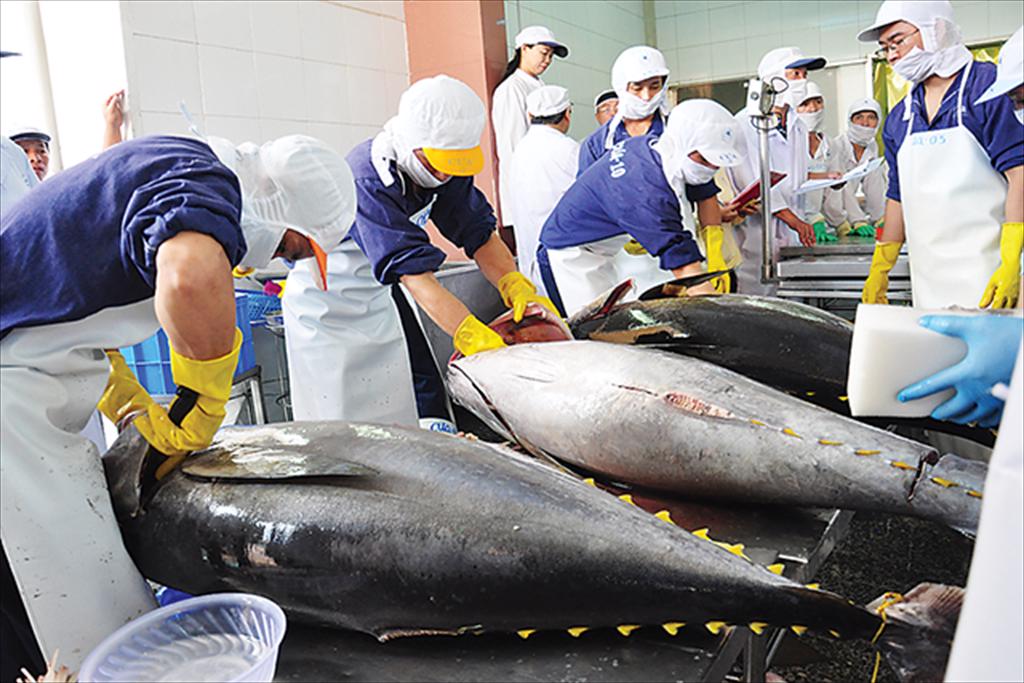(seafood.vasep.com.vn) After three years of implementation, the UK-Vietnam Free Trade Agreement (UKVFTA) has yielded positive results for Vietnam’s tuna exports. The United Kingdom officially became a member of the Comprehensive and Progressive Agreement for Trans-Pacific Partnership (CPTPP) on December 15, 2024. This is expected to bring significant benefits for seafood enterprises, particularly in terms of tariffs and intra-bloc origin regulations - especially for tuna products.

Strong demand for tuna in the UK
According to the UK Committee on Toxicity of Chemicals in Food, Consumer Products, and the Environment (COT), the average seafood consumption per capita in the UK is approximately 217 grams per person per week. Among this, fatty fish (excluding canned tuna) accounts for about one-quarter, equating to over 50 grams per person per week. Notably, changes in consumer behavior following the COVID-19 pandemic have led to increased demand for processed and canned food products due to their convenience.
In 2024, tuna ranked as the third highest-selling seafood in UK retail markets, following salmon and cod. In the UK, tuna is primarily consumed in quick meals such as sandwiches and travel-friendly meals. According to data from Seafish, tuna accounts for 69% of all canned seafood choices among British consumers. Moreover, given the versatility of fatty fish in various culinary applications, other processed tuna products - such as salads, tuna-based sauces, and sandwiches - are also highly favored. Similar to other European markets, UK consumers are increasingly focused not only on the origin and quality of seafood but also on labor standards, environmental impact, and the sustainability of supply chains. Additionally, fundamental factors such as pricing, processing methods, meal compatibility, and usage settings remain key considerations.
In the tuna sector, the largest suppliers to the UK currently include Ecuador (accounting for approximately 29% of total imports), Mauritius (over 13%), Seychelles (11%), Ghana (10%), and Spain (nearly 6%). Meanwhile, several Southeast Asian suppliers hold smaller market shares but still rank among the top 15 tuna exporters to the UK, including the Philippines (7%), Indonesia (2%), Thailand (6%), and Vietnam (1.4%).
Vietnam’s tuna industry needs momentum to boost exports to the UK
Vietnam Customs data shows that Vietnam’s tuna exports to the UK have maintained continuous growth since the implementation of the CPTPP. Export value increased from $5.1 million in 2021 to nearly $7.9 million in 2024, marking a 54% rise. Entering 2025, the UK remains one of the few markets where Vietnam’s tuna exports continue to grow, with a 24% increase year-on-year.
The CPTPP and UKVFTA agreements have created substantial growth momentum for bilateral trade while opening new development opportunities for Vietnam’s tuna industry, particularly as key export markets face declines due to geopolitical tensions and global economic challenges.
A key change in tariff regulations under the CPTPP is the gradual reduction of tariffs on Vietnam’s processed and canned tuna exports to the UK from 20% to 0% over seven years. Meanwhile, under the UKVFTA, these products currently benefit from a 0% tariff only within a quota of 11,500 tons. In the long run, leveraging tariff preferences from these agreements will provide a competitive advantage for Vietnamese tuna exports in the UK market.
According to industry experts, both the CPTPP and UKVFTA are next-generation free trade agreements that require exporting countries and enterprises to enhance their internal capacities. The most significant advantage of the CPTPP is its rules of origin, which allow greater flexibility for exporters. Following the UK's accession, five other economies have formally applied to join the CPTPP: China, Taiwan (September 2021), Ecuador (January 2022), Costa Rica (August 2022), and Uruguay (December 2022). Among them, Ecuador and China are formidable competitors to Vietnam’s tuna industry. Therefore, Vietnamese enterprises must act swiftly to seize the early mover advantage and capture market share. Additionally, securing a stable domestic tuna supply will be a decisive factor in enhancing Vietnam’s competitiveness in this market.
However, to achieve this, the tuna industry requires further incentives to accelerate growth. Specifically, for fishermen, it is crucial to ensure that, alongside compliance with legal regulations - including IUU fishing rules - they are motivated to expand offshore fishing operations and reinvest in their fleets. Moreover, fishermen must be able to harvest and sell raw materials under normal market conditions. As for businesses, efforts should continue to improve the business environment and simplify administrative procedures.
|
TOP 15 TUNA SUPPLIERS TO THE UK, 2023 - 2024
(Unit: USD thousand, Source: ITC)
|
|
Exporters
|
2023
|
2024
|
Change (%)
|
|
Total
|
501.117
|
581.112
|
16
|
|
Ecuador
|
144.258
|
168.409
|
17
|
|
Mauritius
|
76.037
|
75.286
|
-1
|
|
Seychelles
|
55.497
|
64.687
|
17
|
|
Ghana
|
50.743
|
55.343
|
9
|
|
Philippines
|
26.333
|
40.505
|
54
|
|
Thailand
|
18.492
|
34.062
|
84
|
|
Spain
|
29.95
|
33.43
|
12
|
|
Peru
|
21.719
|
30.925
|
42
|
|
Maldives
|
22.581
|
21.337
|
-6
|
|
Korea
|
12.866
|
13.805
|
7
|
|
Indonesia
|
11.661
|
12.922
|
11
|
|
Portugal
|
6.287
|
9.981
|
59
|
|
Vietnam
|
6.316
|
8.056
|
28
|
|
Japan
|
1.574
|
2.273
|
44
|